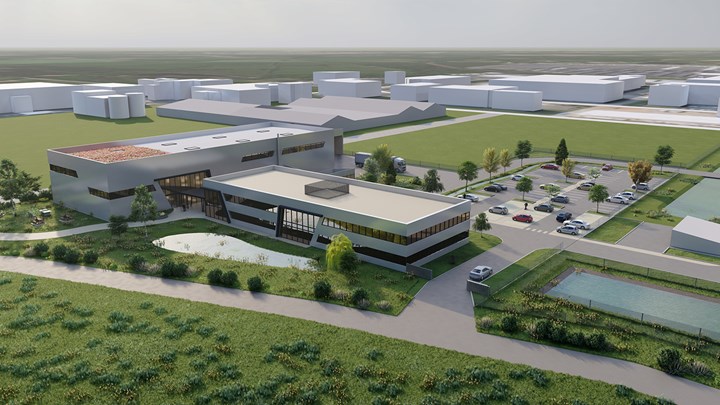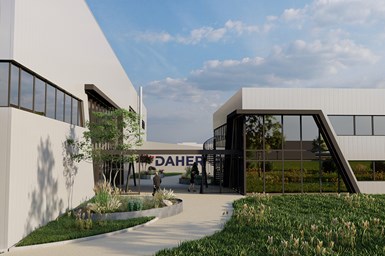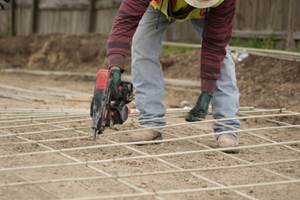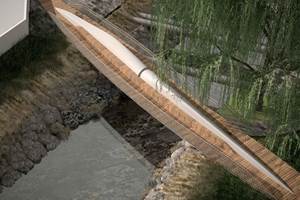Daher lays the cornerstone for Shap’in composite aerostructures innovation center
Based in the Nantes, France region, the Shap’in TechCenter combines R&D and a production plant within a single facility, capitalizing on Daher’s composites expertise.

Shap’in TechCenter rendition. Photo Credit: Daher
Daher (Nantes, France) announces that it has laid the cornerstone for its new 1,600-square-meter Shap’in TechCenter, which will bring together the company’s full spectrum of aerostructures and composites expertise into a single facility. It is located at Saint-Aignan-de-Grandlieu — adjacent to Daher’s specialized production plant for thermoplastic composite aerospace components — in the Jules Verne industrial innovation cluster near Nantes, France, and has an operational startup planned for October 2022.
This €7.5-million project is supported by €800,000 in funding from the French Aerospace Industry Modernization Fund, and will respond to technical, economic and environmental challenges faced by the industry, while also training young talent. Shap’in will employ 160 people, half of whom will work on research and development (R&D) projects.
Purpose, CEO’s vision
The Shap’in TechCenter’s key purpose is to consolidate the company’s leadership in aerostructures technologies — capitalizing on Daher’s technological advances in design and production of aircraft wings, tails and engines — by enabling designs to be put into production faster and with greater agility to meet the key challenges facing the aerospace industry including competitiveness and reduced environmental impact.
“We are proud to see this project come to fruition; a process that has accelerated significantly in recent months thanks to the support we have received from the France Relance national recovery plan,” said Daher CEO Didier Kayat during the cornerstone unveiling ceremony. “Together with Log’In, our future logistics acceleration platform at Toulouse, and Fly’In, the Tarbes innovation center dedicated to the forward development of our aircraft product range, Shap’in further underlines our determination to embrace the future, and will showcase how our technological expertise feeds into a cutting-edge French industry. It also will considerably extend our ability to develop disruptive technologies and their production processes. We are putting the needed resources in place for Daher to remain at the forefront of our industry, while also ensuring our status as a key player in tomorrow’s low-carbon aviation sector.”
Three axes
Daher is the largest independent Tier 1 manufacturer of aerostructures in France, supplying complex aerostructures that require the dual expertise in composites and metals to produce wings, empennages, doors and hatches, fuselages and propulsion systems, as well as their integration. From elementary parts to fully equipped sections, Daher meets critical aerospace industry requirements including cost, quality, production rate and environmental impact.
This combined innovation center and production plant brings together unique skills and resources that will accelerate innovation in aerostructures and their production. Shap’in has been developed around the three key axes:
Expertise
- People: By bringing R&D and production teams together, they will be able to work collaboratively and benefit from each other’s ideas. Shap’in will bring together skills in materials, design, calculation, simulation and processes which were previously spread across different sites. The goal is to accelerate innovation and support the increase in technological maturity of composite aerostructures.
- Materials: While previously dispersed across a number of regions, all Daher composites material testing labs (which also work on behalf of other leading aerospace prime contractors) will now come together at a single site.
- Processes: The TechCenter will oversee new developments in production, new processes (e.g., induction welding, machining, inspection, etc.) and digital integration.
Equipment and Resources
- Shap’in will incorporate pre-development resources to bridge the gap between the lab and production line, as well as facilities for analysis of materials and finished products. These resources will enable research on reducing production costs and carbon footprint as well as boosting performance, to distinctively position Daher in new markets versus its Asian and U.S. competitors.
- Aligned with the Daher Open Innovation strategy, Shap’in will also allow certain machine manufacturers – who are essential to the production of structural composite parts – to test their future equipment on site, in partnership with Daher.
Location
The Nantes region overall is recognized in the aerospace industry for its expertise in advanced composites, including Airbus sites in Nantes and Saint-Nazaire, along with SMEs such as Paprec, tool makers such as Loiretech and industrial technology suppliers such as Coriolis Composites. The region is also known for its ability to respond effectively to tomorrow’s aerospace challenges, including automation and recycling of material offcuts. The Nantes technology hub also boasts a rich and diverse local R&D network including:
- IRT Jules Vernes R&D institute for advanced manufacturing technologies
- Airbus Technocentre
- Composites Technocampus
- EMC2 cluster
- Proxinov
- University of Nantes and Ecole Centrale de Nante.
R&D approach and projects
To better meet the current and future needs of customers, Daher has adopted a 360° approach to innovation:
- Long-term R&D via large-scale projects (most often collaborative), to design the competitive and differentiating solutions of tomorrow in time scales of 3-10 years, including new generation materials, production processes (robotics, cobots ...) and digital transformation (Supply Chain 4.0, digital factory...).
- Short-term open innovation based on sharing of know-how and collaboration with Daher’s teams, customers and innovative ecosystems as accelerators of the innovation process.
Daher participates in 13 projects with CORAC (the French civil aviation research council), serving as a leader for seven. Daher has completed 60 proof of concept projects since 2018 and worked with 360 partners.
Daher committed itself very early on to the future of composite materials that are lighter in weight and faster to produce. These are being pioneered at its Industry 4.0 factory in Saint-Aignan. Primary R&D projects at Daher are focused on four main axes:
Digitization of industrial tools
Daher is committed to further optimization of its production. One of its main efforts in this area is the Oddicea research and technology program (Operational Digitalization for Databased and Inter- Connected Efficient Activities), supported by 4 million euros (40% of the total) from the Loire region. This project’s goal is to position the Daher factory of Saint-Aignan-de-Grandlieu as a regional showcase of the industry of the future, and for aeronautics in particular, as well as piloting Daher’s continued digitization of its facilities. Over a period of four years, Oddicea targets new technologies to optimize all plant processes (e.g., production, control, maintenance, logistics). The goal is to increase overall productivity and achieve economies of scale to respond to the aerospace industry’s need for increased production cadence while ensuring cost-competitiveness and the very high level of quality and technicality required. The program is built around five work packages:
- Connectivity of industrial systems via implementation of a Manufacturing Execution System (MES);
- Further extension of digital assistance/capability at certain workstations;
- Total traceability of production;
- Piloting of digital supply chain;
- Development of a "digital twin" of the plant to enable optimizing production.
Daher is also working to achieve these objectives within CORAC collaborative projects:
- PLATFORM (led by Daher) to develop a modular, flexible and reconfigurable production system;
- AGILES (led by Daher) for an innovative and lean supply chain for general aviation;
- API: Automated painting and application of sealant.
R&D targets, aircraft of tomorrow
During the cornerstone laying ceremony, Daher CEO Kayat summarized the future strategy for which the Shap’in TechCenter plays a key part:
“Regarding product lines, our R&D efforts for more than 15 years have focused on two priority areas: the airfoil and empennage on one hand, and the engine environment on the other. This positioning is linked to our capacity as an aircraft manufacturer: we can develop, demonstrate and validate our innovations and their performance on our own aircraft, the TBM manufactured in Tarbes, France, and since 2019, the Kodiak, manufactured at Sandpoint, Idaho in the United States.
In order for the airplane to retain its place and role in our societies, the aviation sector has initiated major changes that now must be accelerated. The airplane of tomorrow will be low carbon, or it will no longer exist. To achieve this, technological breakthroughs will be needed in many areas: fuel, propulsion, as well as aerostructures, which will need to be both lighter and more efficient to improve aerodynamics and reduce fuel consumption, and also faster to produce and at low cost. For all of these issues, we at Daher have a role to play, and Shap’in will help us achieve it.”
Related Content
Gatorbar, NEG, ExxonMobil join forces for composite rebar
ExxonMobil’s Materia Proxima polyolefin thermoset resin systems and glass fiber from NEG-US is used to produce GatorBar, an industry-leading, glass fiber-reinforced composite rebar (GFRP).
Read MoreRecycling end-of-life composite parts: New methods, markets
From infrastructure solutions to consumer products, Polish recycler Anmet and Netherlands-based researchers are developing new methods for repurposing wind turbine blades and other composite parts.
Read MoreCCG meets customer demand with StormStrong utility pole lineup
Additional diameters build on the portfolio of resilient FRP pole structures for distribution and light pole customers.
Read MoreCCG FRP panels rehabilitate historic Northamption Street Bridge
High-strength, composite molded, prefabricated panels solve weight problems for the heavily-trafficked bridge, providing cantilever sidewalks for wider shared use paths.
Read MoreRead Next
All-recycled, needle-punched nonwoven CFRP slashes carbon footprint of Formula 2 seat
Dallara and Tenowo collaborate to produce a race-ready Formula 2 seat using recycled carbon fiber, reducing CO2 emissions by 97.5% compared to virgin materials.
Read More“Structured air” TPS safeguards composite structures
Powered by an 85% air/15% pure polyimide aerogel, Blueshift’s novel material system protects structures during transient thermal events from -200°C to beyond 2400°C for rockets, battery boxes and more.
Read MoreDeveloping bonded composite repair for ships, offshore units
Bureau Veritas and industry partners issue guidelines and pave the way for certification via StrengthBond Offshore project.
Read More






























